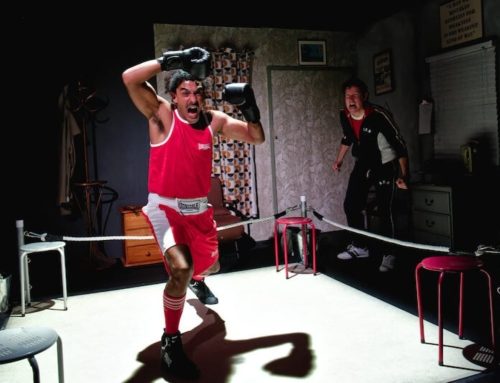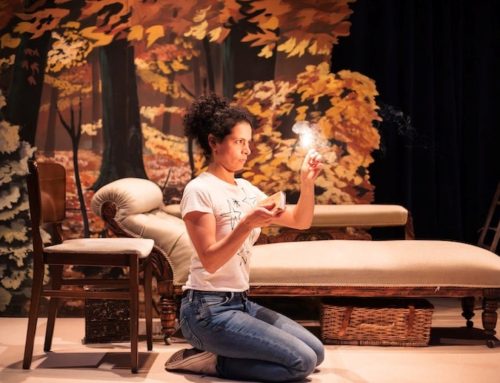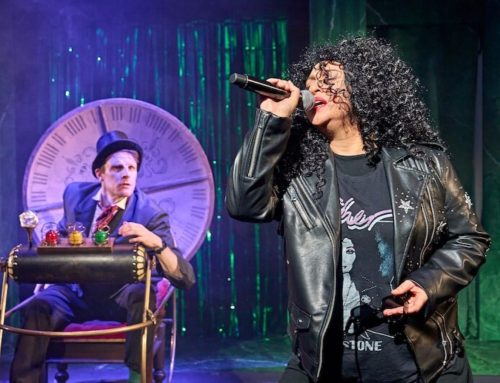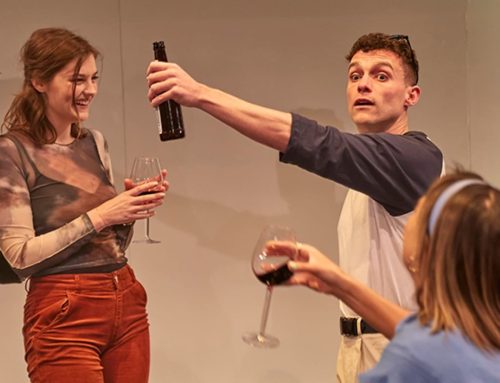Abigail Hood’s dark, troubling Monster is difficult to watch and relies on some unlikely narrative conceits, but the endeavour pays off.
2 August 2022 Press Night
You have to negotiate your way past a fair few trip hazards to access seats at the Park Theatre’s production of Abigail Hood’s brooding new work, Monster. Random piles of bricks, a broken bath, a traffic cone, blocks of splintered wood – you get the idea.
Generally speaking, when a set designer places a random selection of debris haphazardly across the stage in this way, it is telegraphing some kind of metaphorical message that there are some emotional perils in the play that also need to be navigated.
And boy, oh boy, there are certainly some wrecked personalities on display in Monster. Be warned, this is not an easy evening out and (spoiler alert) there are no happy endings here, just some lives that end up less awful than others.
Of course, writer Abigail Hood has a track record of making her audiences feel uneasy. Her bleak and distressing 2018 work Spiral dealt with missing children and domestic abuse in a way that was often difficult to watch. Monster shares some of Spiral’s flaws – in particular thinly sketched characters and an episodic structure more suited to TV than theatre. But, at least in its much better second half, this work feels richer and more mature than anything the writer has achieved before.
Opening in mid 2000s Glasgow, Hood herself plays deeply damaged 14-year-old Glasgow schoolgirl Kayleigh. The girl is not dumb. Indeed, in an unlikely moment of character establishment she quotes poetry by Milton. But the teen is certainly very, very angry. Arrested three times and expelled from school twice, she has also bitten heavily-pregnant school-teacher Rebecca (a standout performance from Emma Keele) on the neck and set fire to a classmate’s hair in revenge for a casual put-down. That level of angry.
We soon learn why. Shunted off to the care of her grandmother at the age of nine, Kayleigh now finds herself back home with brutal, bible-bashing, pill-popping, Jack Daniels swilling monster of a mum Hazel (Gillian Kirkpatrick).
Mum, a maddeningly thinly-written archetype with no backstory to speak of, has taken to poring boiling water over her daughter’s hands as punishment for misbehaviour, imaginary or otherwise. Oh, as a business adjunct to her own sex work, Hazel is also pimping her teen daughter out for cash. No wonder Kayleigh dreams of biting off the penises of the men who rape her and escaping to a better life on the Scottish west coast.
Aside from caring but impotent schoolteacher, Rebecca, Kayleigh’s only positive human relationship comes in the form of dopey school-friend Zoe (Caitlin Fielding). The girls’ budding emotional connection is tested by Kayleigh’s uncontrollable anger, but for an instant at least, they find a kind of love.
Things cannot last of course. After eight weeks in a foster home, Kayleigh returns to Glasgow to find newly-pregnant Zoe engaged to the school’s cleaner (the conception took place in the school bleach cupboard).
A furious Kayleigh seeks solace from new mother Rebecca. But the teacher declines the teen’s call, setting in train a series of horrific events that end in tragedy for everyone concerned.
If the first half is about spiralling into madness, the superior second half, set in 2019 and 2022 is about a search for redemption, for each of the characters.
Adult Kayleigh, now released from prison with a new identity as Tracey, finds she cannot escape the emotional burden of her past so easily. Visibly aged Rebecca and former husband Steve (Kevin Wathen) survey the wreckage of their marriage and (in by far the most affecting scenes of the play) mull over the meaning of forgiveness. Zoe has managed to find a meaningful emotional life, but at the cost of ever having her own children.
I suppose if there is a theme at work here it is that monstrous mothers living in grotesque conditions breed daughters with the capacity to behave like monsters. But much of the rising dramatic tension in the first half depends on a series of connected incidents that are so inherently unlikely, they shatter the first two acts’ internal logic. Would social services really not pay more attention to a family so obviously at risk? Would the school really only have a single teacher interested in the child’s welfare? Would foster parents not notice a girl so obviously entirely spiralling out of control?
The writing is sometimes uneven too – in fact the better-worked second half feels like it has been cut and pasted from an improved second draught. I think this is probably because Hooper is more interested in (or at least comfortable with) writing about redemption and the process of forgiveness than about the events that demand it.
Thankfully, the ending pulls no punches and is suitably ambivalent. But in finding the release her characters demand, Hood is unwaveringly and unswervingly true to who they are.
Recommended.
ABIGAIL HOOD WRITER
KEVIN TOMLINSON DIRECTOR
CAITLIN FIELDING ZOE DOUGLAS
ABIGAIL HOOD KAYLEIGH GREY
EMMA KEELE REBECCA HASTIE
GILLIAN KIRKPATRICK HAZEL GREY
KEVIN TOMLINSON JOHN PARKER
KEVIN WATHEN STEVE HASTIE
Duration: 2 hours, 10 minutes. One interval.
Full Disclosure: I paid full box-office price for the ticket.

More Recent Reviews
Playfight. Soho Theatre.
Writer Julia Grogan’s breathtakingly assured debut play arrives at Soho Theatre following stellar reviews at the Edinburgh Fringe and [...]
All The Happy Things. Soho Theatre.
Naomi Denny’s three-hander comedy-drama All The Happy Things covers familiar themes within a recognisable premise. A grieving protagonist comes [...]
Telly. Bread and Roses Theatre.
The challenge with absurdist comedy is that many people do not find it funny. Laughing at the sheer weirdness [...]





